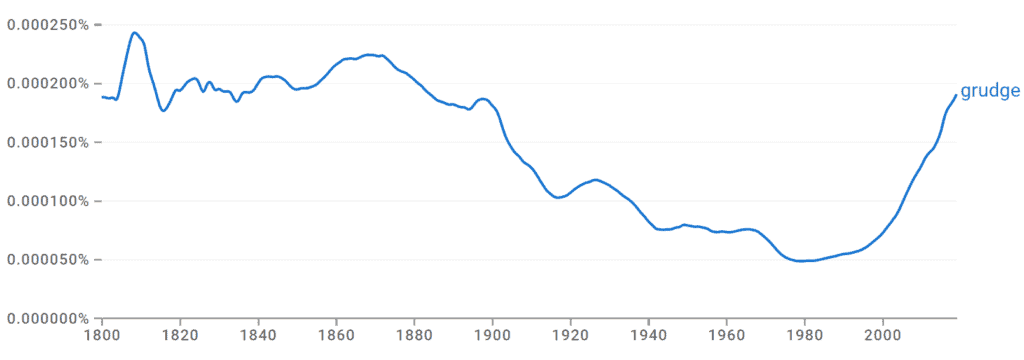The term “grudge” refers to a feeling of resentment or ill will towards someone or something, often stemming from a past disagreement or injury.
It can also refer to the actual act of holding a grudge or to the specific issue or grievance that is the source of the resentment. Learn more about this negative word and how you can use it in speech and writing with my breakdown and sentence examples.
Origin of Grudge

The origin of grudge can be traced back to the Old Norse word “grǫð,” which means “wrath” or “hatred.” This root can also be seen in the Old English word “grēd,” which means “enmity” or “hostility.”
Over time, translations of grudge have evolved to encompass a more specific sense of holding a long-standing grievance or resentment.
Grudge Meaning

In everyday usage, the word “grudge” is often used to describe a negative emotion that someone holds towards someone or something, often stemming from a past disagreement or hurt.
Someone might have long-term grudges against their former employer because they feel that they were unfairly fired, or someone has a grudge against their ex-partner because they feel they were mistreated in the relationship.
What Does It Mean to Hold a Grudge?
It’s important to note that a grudge is not the same thing as a legitimate grievance. While a grudge is a negative emotion that is based on past events, a grievance is a specific issue or complaint that is being addressed.
It’s possible to have a legitimate grievance without holding a grudge, and it’s also possible to hold a grudge without having a legitimate grievance.
Nursing grudges can be detrimental to both the person holding the grudge and the person or thing that they have a grudge against.
Grudges can cause people to act in unkind or unreasonable ways, and they can also create a negative atmosphere in relationships and communities. It’s generally considered healthier to try to let go of grudges and resolve conflicts in a more constructive way.
Can You Resolve a Grudge?
There are some methods you might try to resolve grudges or conflicts. One common approach is to try to communicate directly with the person or thing that the grudge is directed towards.
This can involve having a conversation or mediation session to try to understand each other’s perspectives and find a way to move forward. Another approach is to seek outside help, such as through therapy or counseling. This can be particularly helpful for dealing with grudges that stem from deeper, long-standing issues.
It’s also possible to try to resolve grudges on your own by finding ways to let go of negative emotions and move on from the past. This might involve practicing forgiveness or finding ways to look at the situation in a more positive light.
It can also be helpful to practice self-care and engage in activities that bring joy and happiness, as this can help to reduce negative emotions and promote healing.
Examples of Grudge in a Sentence
These simple phrases with grudge in them show how you can use it in everyday language.
- That guy has had a grudge against me ever since I married the girl he dated in high school.
- I don’t hold a grudge against anyone. I believe in forgiving and forgetting.
- Please don’t hold a grudge against me for my actions. I can make it up to you.
What Are Other Words for Grudge?
- Resentment
- Bitterness
- Rancor
- Umbrage
- Hard feelings
Final Words on Grudge
The common term “grudge” refers to a feeling of resentment or ill will towards someone or something, often stemming from a past disagreement or injury. Make sure not to mix it up with the word grievance when speaking or writing.
